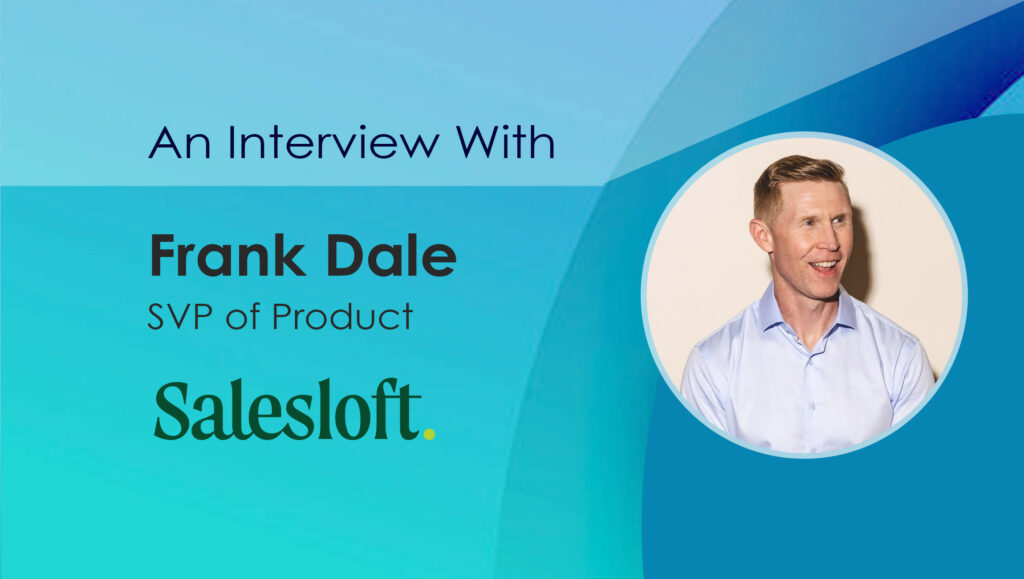Frank Dale, SVP of Product at Salesloft chats about the challenges that B2B sellers often face today with a few tips that can help alleviate most of them:
_________
Welcome to this SalesTechStar chat Frank, tell us about yourself and your role at Salesloft. How has your journey been in the B2B tech market so far?
My time in the B2B tech space, whether I’ve been at Salesloft or elsewhere, has always been about making people more successful and happier at work. I started my career in sales and my father was a salesperson for over 40 years. This means I have a unique passion for the people we serve at Salesloft because I understand what a stressful and difficult job it can be.
I recently worked with an exec coach to articulate what motivates me, and we came up with three core drives that fulfill me: creating, serving, and competing. I joined Salesloft in late 2019 through our acquisition of Costello, and since then have been able to pursue all three of these drives. I like to help people through software, and that’s a level of empathy shared by not only Salesloft’s product team, but the entire organization.
Every day, I get to show up to work and focus on removing friction in the average sales rep’s workday. I get to alleviate pains that I felt as a salesperson, and that my father felt too.
What are some of the top challenges in enterprise sales roles that you see B2B salespeople struggle with?
The number one thing that comes to mind here is noise. There are two key types of noise that B2B salespeople deal with that I’d like to unpack, both of which pose significant challenges.
The first type of noise exists in the broader marketplace. People use and abuse sales technology, spam blasting the world indiscriminately and making it more difficult to stand out from the crowd. At Salesloft, we encourage sellers to connect authentically with their buyers so people aren’t using the products we create in an unintended or potentially harmful way. You won’t see, for example, a Salesloft product that allows a seller to automatically call a prospect every five minutes until they pick up – that would be horrible! That said, connecting with the right person at the right time amid countless other vendors vying for the same attention is quite the feat.
The other type of noise salespeople must contend with exists within the daily workflow itself. In the olden days, reps just had to worry about two major channels of communication: phone calls and emails. Today it is a different story. In addition to those tried and true channels, the average seller is texting with buyers, participating in video calls, recording and sending those calls, and fielding signals from the dozens of different apps and tools across which their workflow is spread.
If you consider the noise generated by doing that across 30-40 deals each with 6-8 buyers involved, it becomes deafening! How is a rep supposed to decide what to prioritize and when? And what happens when important messages inevitably slip through the cracks?
Aside from noise, today’s enterprise seller is dealing with lengthy deal cycles; the economic challenges of a tech stack comprised of a dozen or so point solutions; and consequent fragmented seller and buyer experiences.
Read More: Capgemini To Strengthen Its Data And Analytics Capabilities In Germany With The Acquisition Of…
What better salestech adjustments should these teams be looking at to help bridge this gap?
Right now, sales engagement and sales coaching software are the most important investments an enterprise can make. The majority of sales is conducted with a distributed sales team these days, which means managers are rarely in the same room with their sellers. That makes it much harder to know how they can help individual sellers improve. Coaching is one of the most high leverage things teams do, but it often falls by the wayside because it’s incredibly time consuming.
To effectively coach, sales managers need to know exactly what reps are struggling with and what must happen to bring out their most productive selves at work. The right coaching software will surface real-time data on each member of the team so managers have all the information they need right at their fingertips. This tech allows sales managers to identify key trends, assess performance as it relates to reps meeting their quota, and even drill into call recordings and emails to understand how efficient and effective salespeople actually are at prospecting and closing deals.
Can you talk about some of the most innovative salestech features that you feel are ideal to help shape and redefine revenue processes for B2B teams, but at the same time aren’t optimized or used enough?
This is another area where coaching comes to mind. The majority of sales managers – whether it’s due to a lack of resources, time, or expertise – are not working with their reps to hone important, underlying skills. They’re often assisting with a specific deal or an email response and that helps in the moment, but it’s the slowest way to sustainably lift seller performance.
Managers can’t review every call, email, and text so in the end the seller underperforms. The sales manager today has one of the hardest jobs because they’re the linchpin between the strategy set out by revenue leaders and execution on the frontlines.
The average manager is spread thin and as a result they tend to coach based on what’s immediately in front of them versus focusing on what a given individual needs to do to consistently lift their performance. There are comprehensive tools out there to help managers focus and optimize their coaching efforts, but most coaching solutions today are point solutions that solve for either a sellers email game or their call game and miss the opportunity to focus on the most impactful place to invest coaching for the given individual.
Read More: SalesTechStar Interview with Keith Feingold, Vice President of Worldwide Sales at Onymos
Tell us a bit about Salesloft’s recent announcement, Rhythm. How is this bringing forward a better future for sellers?
The sales profession as it exists today is too hard. In a typical sales organization, you need 60-70% of sellers to hit their number if you want to meet or beat your company’s target. But today, only 43% of sellers actually achieve this. That’s a huge gap. With the abundance of technology out there designed to make sales easier, why are so many reps struggling to keep up?
Sellers spend the majority of their time swivel-chairing from app to app and chasing down the right information at the right time. With so much critical customer data stretched out across so many apps, it’s inevitable that important things fall through the cracks. The average sales rep finds themselves working for their technology, rather than the technology working for them.
Enter: Rhythm. Rhythm is a signal-to-action engine that synthesizes signals across Salesloft’s entire ecosystem, prioritizes them, and guides sellers to success. It’s a single open platform that ingests signals like emails, click-through notifications, and text messages using APIs, then recommends the next best action and prioritizes it based on immediacy and impact. By presenting sales reps with a prioritized list of actions aligned with the outcomes they need to hit their number, Rhythm allows salespeople to confidently answer the most important question they face every single day: How should I be spending my time?
As the sales role becomes more and more digitized with each passing day, it’s critical that salestech isn’t just made up of one-off point solutions and quick fixes. Salestech developers and vendors have a responsibility to our customers: if we’re promising to make their lives easier, that’s a promise we must deliver on. We can achieve this by providing them with tools that actually help them develop their skills and streamline their workflows.
A few thoughts on the future of the B2B sales market?
The B2B sales market is going to become more data informed as tools like Rhythm begin to take hold. We’ll get to a place where this data helps salespeople make better choices, ultimately leading to better performance across every industry.
Our vision for the future of B2B sales can be likened to the use of a fitness tracker like Whoop. Whoop has changed the way I live my life by helping me understand my glucose levels, sleep patterns, and how choices like that impact how I feel each day. This quantified self is coming to sales. With Rhythm we’re taking all the data we have available and telling reps, “Here’s what’s going to work for you,” rather than slapping them with a one size fits all, non-specific guided selling solution.
That’s a major advantage of the world digitizing so quickly. Having access to so much data means we’re at the precipice of being able to empower B2B sellers like never before.
And finally, a few views on salestech as a segment and how you feel this space will shape up over the next few years?
The salestech segment is in dire need of a hard look in the mirror. Over the past few years, we’ve seen a number of salestech vendors achieve incredibly high valuations, but many sold a vision they couldn’t back up with product strategy. These companies are currently over their skis, looking for ways to survive and throwing product ideas against the wall to see what sticks.
There’s a reckoning when it comes to product strategy that must happen in the sales tech segment sooner rather than later. Solution providers need to recognize the difference between building additional products because they want to sell something, and creating products that deliver better experiences to the customer and actually work together to create seamless workflows. Salespeople don’t want a bag of parts they have to assemble themselves; they want comprehensive tools that simplify their workdays and make their lives easier.
The average B2B sales rep is entirely dependent on digital tools to complete their daily tasks. The time for quick fixes and point solutions is over. It’s time for solution providers to get strategic and really start thinking about how our products impact the lives of our customers.
Read More: Streamlining Sales by Increasing Knowledge Share and Communication
Salesloft is the provider of the leading sales engagement platform that helps sellers and sales teams drive more revenue.
Frank Dale is the Senior Vice President of Product Development at Salesloft. Prior to joining Salesloft, he was the CEO and co-founder of Costello which was later acquired by Salesloft. Over the past 10+ years, he has held a wide range of CEO, COO, and VP positions across several software companies including DemandJump, KSM Consulting, and Compendium which was later acquired by Oracle. Frank is a frequent speaker at conventions across the country where he discusses topics such as entrepreneurship, marketing strategies, and leadership. In 2013, he was recognized by the Indianapolis Business Journal as a “40 under 40” recipient. Additionally, Frank loves utilizing neuroscience and psychology research to write articles on motivation, reaching goals, and effective time management.
Missed The Latest Episode of The SalesStar Podcast? Have a quick listen here!
Episode 139: Decoding Enterprise Sales Fundamentals with Molly McKinstry, Head of Enterprise Sales, Calendly
Episode 138: Marketing and Ops Tips for B2B Teams with Camela Thompson, VP Marketing at CaliberMind
Episode 137: Sales and Revenue Ops Best Practices with Jamie Shanks, CEO of Pipeline Signals & Sales for Life























